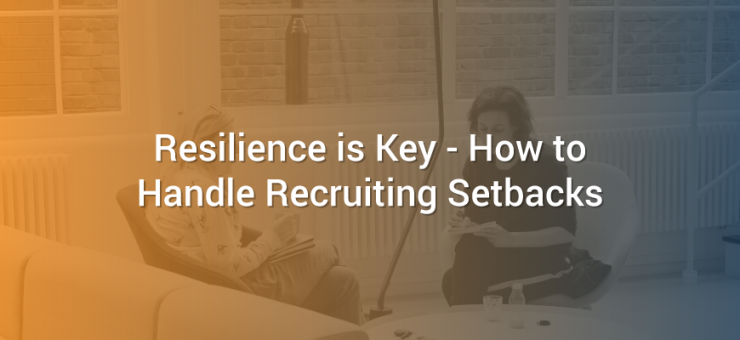You’re the last to learn a client’s role requirements for a job have shifted, fresh and skilled candidates won’t give you the time of day, and the candidates you are already connected with aren’t cutting it — and that’s just Monday.
Our 2018 Growth Hiring Trends in the United States Report revealed 77 percent of companies planned to increase their staff by 25 percent last year. And according to the 2018 Recruiter Nation Survey by Jobvite, competition was expected to increase for 74 percent of recruiters in 2019.
There’s no question pressure is high for you to fill clients’ open positions. From talent shortages to high expectations of candidates to slow client decision-making processes, setbacks in the recruiting process are inevitable.
You can’t control everything. But you have to stay resilient and move forward confidently regardless of the circumstances. While they’re frustrating, setbacks in the recruiting process offer numerous opportunities to step back, assess, reset, and power onward.
Here are some new ways to approach a few recruiting setbacks you’ve likely encountered:
Clients aren’t communicating their needs effectively
Let’s face it, the needs of your clients change and evolve rapidly. This causes you unnecessary stress if role requirements and specific needs aren’t clearly and quickly communicated. It’s also a poor setup for the candidate experience.
The opportunity: When you conduct check-ins with clients, work together to establish a more inclusive communication process. Ask to be included on emails, added to team chats, and given access to communication tools regularly used to discuss job openings and candidate evaluations.
Then, determine how well their needs were previously met by your recruiting process. Ask clients to give you their impressions and feedback regarding past placements. Were their critical skills or experience requirements lacking? What about soft skills? Was the timeline effective? Did they feel prepared to move forward?
In return, share your recruiting KPIs. This data helps you develop a more effective strategy together. Regular metrics sharing and discussion build a stronger, more communicative relationship with your clients.
Candidates pass over your outreach and proposed opportunities
Competition for candidates is fierce. Job openings are at a 17-year high while the unemployment rate remains low, at just 3.9 percent. If you’re feeling the sting of rejection from good candidates right now, you’re not alone.
The opportunity: Take a step back and reevaluate the impressions you’re making with your recruiting communications. Start by reviewing past candidate correspondence.
Imagine yourself as the recipient of the message and honestly evaluate if it feels authentic and personal. Ask colleagues to critique them as well. Even the perfect opportunity won’t win over a candidate if your emails read awkward or robotic.
Drop the pitch and start with a personal connection, especially when it comes to reaching passive candidates in the recruiting process. Focus on transforming the candidate experience and building a stronger relationship well before the conversation about specific opportunities comes up. This can be as simple as redeveloping questions and exchanges to prove you’ve done your research about the candidate.
You’re experiencing a recruiting dry spell
You once had a strong network of candidates. But lately, it seems like connections with skilled talent just aren’t happening. Establishing and maintaining real connections with candidates isn’t always easy. Especially when you’re recruiting for multiple roles with multiple organizations while being pulled in many directions.
The opportunity: Gather feedback on where the connection breakdown with candidates occurs. At what part of the recruiting process is there a notable dropoff? You should also look at the candidates you made excellent connections with previously to find out what they liked and what made your communication stand out. Was it a shared network or specific connection?
Speaking of networks, this may also be a great time to assess your referral program. How can you incentivize these connections through your network or referrals from previously placed candidates?
Candidate qualifications are lacking
You’re finally making meaningful connections with passive and active candidates. They seem interested and ready to embark on the hiring process, but when it comes down to the screening process, candidates’ skills aren’t where they need to be.
The skills gap in the workforce isn’t doing you any favors. In fact, 52 percent of HR professionals in a 2019 SHRM study shared the skills gap has worsened in the past two years.
The opportunity: If candidates’ qualifications aren’t impressing you, they’re not going to impress your clients. Dig into your recruiting KPIs for a new perspective.
Look specifically at where you source the majority of highly-qualified talent versus candidates that just make the cut. It’s easy to default to the same trusted talent sources, but hard data should always drive where you go to access the most skilled candidates.
Consider exploring talent groups your typical screening process may weed out, such as candidates that lack traditional experience in your clients’ open roles. Overcoming these challenges will empower you to create a better recruitment process and build a stronger pool of talent through resilience and problem-solving.












